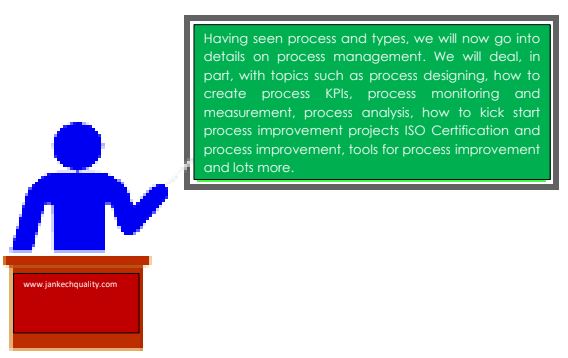As stated in the earlier publication, business processes constitute all the activities a company engages in, using people, technology and information to carry out its mission, set goals, measure performance, serve customers and address the challenges that arise while doing so. Processes determine the effectiveness and efficiency of the organization’s operations, quality of customers’ experiences and ultimately the organization’s financial success.
Types of Processes
Every organization contain large numbers of processes from the simple one unit processes e.g. entering customer’s order in the system to the multi – departmental processes e.g. order to cash.
Informal and Formal Processes
The degree of formality of processes differs from one process to another. Informal processes are often undocumented and unplanned e.g. a contact person in a company that is a long standing customer of your organization demands for a discount for the purchase of a double of what they usually buy. You may decide to give the discount owing to the quantity being bought as well as the long standing business relationship. But your organization has no documentation for giving such a discount hence it become an informal process Many processes start as informal processes and end up being formalized by documenting the steps to actualizing the objectives of the said process. For instance, let us suppose that you created an informal process by asking employees in your organization to suggest suitable candidates for a vacant position in the organization. You may decide to formalize this process if the output is very impressive, especially if the candidate engaged through this process excels in that position. You may even attach some incentives to the process to make employees participate.
A formal process is one that the inputs, activities and interactions and intended output have been determined and documented. All employees of the organization willing to carry out the process are expected to follow the steps documented in the documented procedure and new hires are trained to follow the procedure. For example, the customers’ complaint resolution process, order to delivery process, etc.
Management, Operational and Support Processes
Processes are also classified as management, operational and supporting processes Management processes do not imply the processes of the management employees rather they are the processes that are govern the corporate behaviors and operations of an organization.
Typical management processes include strategic planning and deployment process, corporate governance processes and risks and opportunities management processes.
Operational processes are the core processes of the organization. These are business processes that form the primary objectives of the entire organization and subsequently create the primary value stream. The typical core processes of the organization, depending on the context of the organization, include sales and marketing, engineering, purchasing, manufacturing, distribution, logistics, etc.
Supporting processes are those processes that support and enhance the performance of the core processes. Without the support processes, it becomes difficult to wholly actualize the objectives of the core processes. Typical supporting processes include Information Technology, Human Resources Management, Finance, Service delivery processes like project and process management, customer care/relationship management, technical support like quality control and assurance, environmental and occupational health and safety management, security
management, etc.

